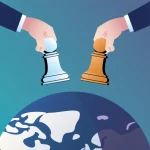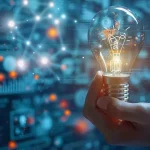Introduction
The year 2025 marks a defining moment for global business as technology and innovation transform industries at an unprecedented pace. Artificial intelligence, blockchain, quantum computing, biotechnology, and green technologies are no longer emerging trends—they are the new foundation of economies worldwide. Businesses that adapt to these changes are thriving, while those that resist risk falling into irrelevance.
- Introduction
- Artificial Intelligence as the Core of Transformation
- The Blockchain Revolution in Business
- Quantum Computing: Unlocking New Frontiers
- Biotechnology and Healthcare Innovations
- Green Tech and the Sustainable Business Movement
- The Rise of the Digital Workforce
- The Challenge of Regulation and Ethics
- Global Business Competition and Cooperation
- FAQs
- Conclusion
The interplay between innovation and business has created opportunities for growth but has also raised challenges around regulation, data privacy, and workforce readiness. In this article, we explore how technology is reshaping industries, creating new opportunities, and changing the future of global business.
Artificial Intelligence as the Core of Transformation
Artificial intelligence (AI) has become the heartbeat of innovation in 2025. Businesses across all sectors—from healthcare to finance to retail—are integrating AI into their core operations.
In finance, AI algorithms analyze vast data sets in seconds, detecting fraud and making real-time investment recommendations. In healthcare, AI assists doctors in diagnosing complex diseases and personalizing treatments. Retail giants are using AI-powered chatbots and recommendation engines to offer hyper-personalized shopping experiences.
AI is no longer just a tool; it is a strategic driver of competitiveness. Companies that fail to harness AI risk being left behind in an AI-driven global marketplace.
The Blockchain Revolution in Business
Blockchain technology, once synonymous with cryptocurrencies, has matured into a powerful tool for global business. In 2025, it underpins supply chain management, digital identity verification, and secure financial transactions.
For instance, food companies now use blockchain to trace every step of production—from farms to supermarkets—ensuring transparency and safety. Similarly, global logistics firms leverage blockchain for real-time tracking of goods, reducing fraud and increasing efficiency.
The rise of decentralized finance (DeFi) platforms has also disrupted traditional banking, allowing businesses and individuals to transact without intermediaries. While regulators remain cautious, blockchain is proving to be a backbone of trust in a digital economy.
Quantum Computing: Unlocking New Frontiers
Quantum computing is another game-changer in 2025. Though still in its early stages, industries like pharmaceuticals, aerospace, and climate science are reaping its benefits.
Pharmaceutical companies are using quantum simulations to design new drugs at speeds unimaginable a decade ago. Aerospace firms apply quantum models to improve flight efficiency and reduce fuel consumption. Climate scientists employ quantum systems to simulate weather patterns with greater accuracy, helping governments prepare for natural disasters.
As quantum computing moves closer to commercial viability, it is set to disrupt industries in ways similar to how the internet transformed the late 20th century.
Biotechnology and Healthcare Innovations
The COVID-19 pandemic accelerated innovation in biotechnology, and by 2025 the momentum has only grown. Advances in gene editing, synthetic biology, and personalized medicine are transforming healthcare.
CRISPR technology is being applied not only to treat genetic diseases but also to enhance agricultural production. Personalized medicine, powered by genomics and AI, allows doctors to tailor treatments for individuals, reducing side effects and improving outcomes.
Moreover, wearable health tech and remote patient monitoring systems are redefining healthcare delivery, making it more accessible and efficient. Biotechnology is no longer confined to labs; it is actively shaping how people live and thrive.
Green Tech and the Sustainable Business Movement
Sustainability is no longer optional in 2025—it is a business necessity. Companies that fail to adopt sustainable practices face regulatory penalties and loss of consumer trust.
Green technologies, including renewable energy, carbon capture systems, and sustainable manufacturing, are becoming mainstream. Electric vehicles dominate the automotive industry, while corporations across sectors are committing to net-zero carbon emissions.
Consumers, especially younger generations, are rewarding eco-conscious brands, creating market pressure for businesses to align profit with purpose. Green tech is proving that innovation and sustainability can go hand in hand, generating both environmental and economic benefits.
The Rise of the Digital Workforce
The global workforce in 2025 is more digital, flexible, and AI-driven than ever before. Remote work, once a pandemic necessity, has become the standard in many industries.
Automation and robotics have replaced repetitive tasks, allowing humans to focus on creativity, strategy, and innovation. However, this transition has raised challenges around job displacement and the need for reskilling. Governments and corporations are investing heavily in upskilling programs to prepare workers for an AI-driven economy.
The digital workforce is not just about humans working with technology—it is about humans and AI collaborating to create new possibilities.
The Challenge of Regulation and Ethics
With rapid innovation comes the pressing challenge of regulation. Governments are struggling to keep pace with technological advancements, particularly in AI, data privacy, and biotechnology.
Debates around AI ethics—such as bias in algorithms and the misuse of facial recognition—remain unresolved. Similarly, the rise of DeFi and blockchain has regulators concerned about money laundering and financial stability. Biotechnology innovations raise questions about genetic manipulation and long-term ecological impacts.
The balance between innovation and ethical responsibility is one of the greatest challenges businesses face in 2025.
Global Business Competition and Cooperation
The new era of tech-driven business is both competitive and collaborative. Nations are competing fiercely to dominate sectors like AI, quantum computing, and green technology. At the same time, international cooperation is essential to address shared challenges such as cybersecurity, climate change, and global supply chain disruptions.
Multinational corporations play a pivotal role in shaping the business landscape, often wielding more influence than governments. Tech giants, startups, and innovative nations are all vying for leadership in a future where innovation is the ultimate currency.
FAQs
Which technologies are transforming business in 2025?
Artificial intelligence, blockchain, quantum computing, biotechnology, and green technologies are leading the transformation.
How is AI changing industries?
AI is optimizing operations, improving decision-making, enhancing customer experiences, and driving innovation across sectors.
What role does blockchain play in business today?
Blockchain ensures transparency, security, and efficiency in supply chains, financial transactions, and digital identity systems.
Why is sustainability so important for businesses now?
Consumers and regulators demand eco-conscious practices, making sustainability essential for profitability and reputation.
How is the workforce adapting to technological change?
Workers are transitioning into digital roles, supported by automation and reskilling programs, while collaborating with AI systems.
Conclusion
Tech and innovation in 2025 are redefining global business, creating unprecedented opportunities and complex challenges. From AI-driven transformations to blockchain’s secure systems and green technology’s sustainable future, industries are undergoing radical shifts.
Businesses that embrace innovation responsibly are thriving, while those resistant to change risk irrelevance.
The next decade will not be defined solely by technological advancements but by how businesses, governments, and societies manage the ethical and social implications of innovation.
For readers of Dusktimes.com, understanding these transformations is crucial, as the businesses shaping today’s innovation will also define the future of the global economy.






